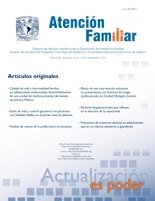Quality of Life and Family Functionality of Pregnant Adolescents Users of a Family Medicine Unit in the State of Sonora, Mexico
Main Article Content
Abstract
Objective: to determine the quality of life and family functionality in pregnant adolescents who attend the Family Medicine unit no. 1 (umf) in Ciudad Obregon, Sonora, Mexico. Methods: cross-sectional and descriptive study in pregnant adolescents, randomly selected was carried out. It was applied the sf-36 instrument to evaluate quality of life related to health as well as the family apgar test to assess its functionality. The statistical analysis was performed with descriptive statistics: frequencies, percentages, measures of central tendency and dispersion. Results: from 65 surveyed patients, 76.9% had good quality of life and 23.1% bad; while 12.3% showed severe family dysfunction, 38.5% moderate dysfunction and 49.2% was a member of a functional family. The predominated marital status was unmarried with 75.4%, level of education: high school 69.2% and 53.3% came from the working class. Conclusion: quality of life of pregnant adolescents is good in almost 8 out of 10 cases and the family remains functional in about half of them.
Downloads
Download data is not yet available.
Article Details
How to Cite
Soto-Acevedo, F., León-Corrales, I. A., & Castañeda-Sánchez, O. (2015). Quality of Life and Family Functionality of Pregnant Adolescents Users of a Family Medicine Unit in the State of Sonora, Mexico. Atención Familiar, 22(3). https://doi.org/10.22201/facmed.14058871p.2015.3.50727
